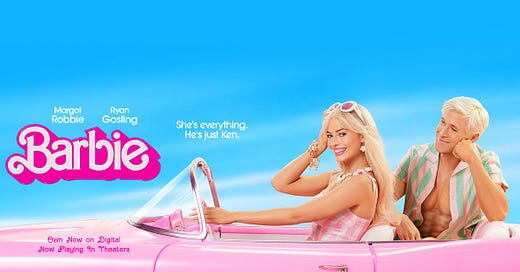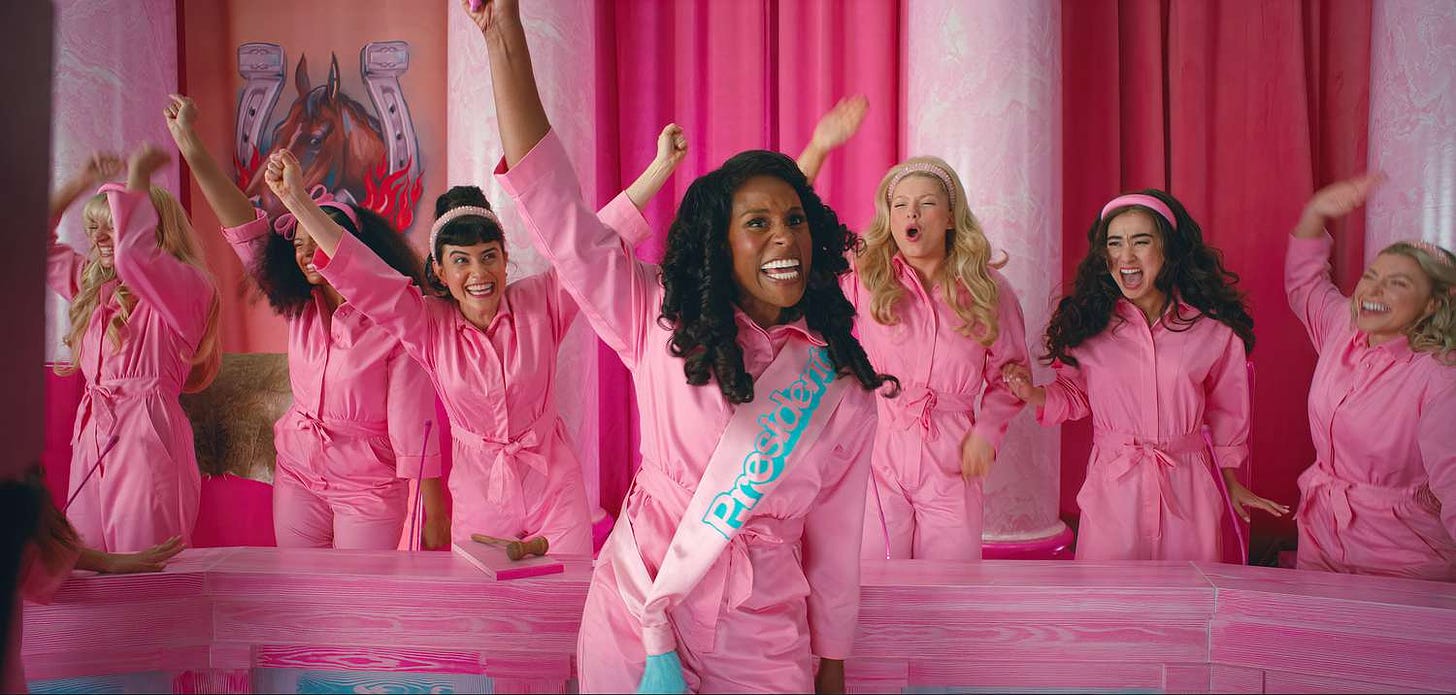(This review is months late because I waited until, watching the movie at home, I could pause to groan aloud and check the time remaining, both of which I did frequently—as my husband can attest.)
**
I have changed my mind about Barbie. When I discussed it last week with my good friend Tom Golden (you can see our conversation here), I advised against viewing it.
I now recommend giving it a watch, not for pleasure or even ideological interest—it is too dull and humorless for that, with a senseless plot, wooden dialogue, and a coy voice-over—but for clarification. The high-grossing movie offers a vivid encapsulation of our culture’s view of men and women, complete with its own inadvertent self-subversion. Watching it is a leaden but useful reminder that feminists really are this self-destructively stupid, and really do want to destroy “patriarchy,” by which they mean masculine freedom, self-respect, and leadership. They no longer even pretend to value equality.
Men and boys (and the women who love them), take a good look.
In Barbie, men are at best second-class citizens who by movie’s end, in an improvement over their former nullity, are content to follow banal female directives about their attitudes and identity. In a jaw-droppingly condescending scene after the failed Ken Rebellion, Ken is counseled on how to find himself. He is told that it’s okay to cry (as he bawls like a baby) and is admonished to “figure out who you are without [Barbie/woman].” He and the other Kens seem grateful for the puerile admonition and willing to be male on Barbie terms: sexless, rudderless, effeminate. They certainly can’t be equal, the film makes clear, because they make a mess when they’re in charge.
Keeping men in check means shielding them even from images of patriarchal (meaning competent, self-directed, masculine) men: Ken runs amok only after seeing a world (the “real world”) in which men are allegedly respected merely for being men, one of the more risible feminist lies in the movie. Feminists have never understood that men earn respect. But in the feminist vision, any possibility that men may perceive themselves as essential to their society—and as owed acknowledgement for the goods they bring—must be suppressed. Only women are essential.
Perhaps the feminist director of Barbie intended the portrayal of the Kens to reflect the situation of women under patriarchy (one searches in vain for a coherent analytical perspective). In Barbie Land, Kens are objects (not sex objects since there is no sex or even heterosexual desire) who exist only to compete, fruitlessly, for Barbies’ attention.
In the real patriarchal past, of course, women were never so reduced precisely because of male sexual longing, love, familial affection, chivalry, religious ideals, empathy, reasoning about justice, and the desire for procreation. All such longings or allegiances are absent from Barbie life. If the Barbies desire children and family—never made clear in the movie, though perhaps gestured to in the final scene when Barbie, now human, visits her gynecologist—theirs will likely be families without Kens. Whether in the real world or in Barbie Land, men are peripheral at best, dangerous at worst, and often mildly contemptible and tiresome with their “egos and petty jealousies.” The only good thing about Kens is that they are easy to manipulate.
The disdain is fathoms deep.
Women, in contrast, are complete in themselves, sufficient for each other in a world in which all positions of power—from President to CEO, doctor, pilot, astronaut, ambulance worker, professional athlete, and Nobel Prize-winning journalist—are occupied by women (and a few trans people, it seems), and in which neighborhoods function without any dirty, dangerous jobs, external threats, heavy machinery, complex repairs, or strenuous labor.
This aspect of the movie, by the way, is a striking illustration of the inability of the feminist mind to remember or even understand what men actually do: the risky, body-wearying and ingenuity-demanding work that feminists only rarely, if ever, advocate for women and which they are frequently hard-pressed even to name. One of the many magic tricks of feminism is its continual disappearing of distinctive male inventiveness, skill, adaptability, and heavy-lifting.
With its combined silliness and derision, Barbie reminds us that feminism has not once in 50 years been held to account, and that its vast incoherence has only increased its appeal—as is illustrated in the scene of the suppression of the Ken Rebellion, in which the worst thing the Kens did, apparently, was make women love them. Above all, love between men and women is presented as a threat to feminist values.
The Ken Rebellion upsets Barbies’ monopoly on power as the Kens establish a hyper-masculine culture, which the director cannot imagine apart from beer, horses, swagger, and big-screen TVs. They are assisted by doting Barbies.
From the feminist point of view, it’s clear why the new arrangement is so upsetting, as it involves once-self-sufficient career women giving up their independence to care for men. From a non-feminist point of view, however, it’s impossible to see how Kendom is anywhere near as alienating and oppressive as what had existed, and will be restored, in Barbie Land, where the Kens are nothing and the Barbies are self-satisfied, sexless lesbian-femmes.
In Kendom, each sex cares for the other, as is made clear when Barbie and her allies stage their counter-rebellion, which involves distracting the Kens in order to “deprogram” the loving Barbies. The Kens are easily distracted by requests for help—whether to aid Barbie with her computer program, explain the plot of The Godfather, or give financial advice. Patriarchy is undermined by men’s propensity to care (“Kens can’t resist a damsel in distress”), a weakness the Barbies, significantly, do not possess. In the movie as in life, Ken wants Barbie more than Barbie wants Ken, and we are supposed to applaud Barbie coldness.
Even a feminist parody of patriarchy looks preferable, it turns out, to the Barbie vision of gynocracy.
It is never made clear how the Kens took over Barbie Land. Given the feminist claim that patriarchy was built on a combination of brute force and socialization, the omission is notable. We’re told only that the Barbies had no natural defenses against it, as if patriarchy were a contagious disease akin to smallpox. But doesn’t that suggest a naturally ingrained female desire to honor protective men? The film does not explore the implications.
The process by which the compliant Barbies are turned back into badass Barbies is made explicit; in fact, it is the highlight of the movie, beginning with a much-applauded set speech around which the rest of the film pivots.
In a nails-on-chalkboard voice, Barbie’s human friend rallies the troops with a feminist rant (one that, according to reviewers, “said what all women are thinking”) about the many demands that make it “literally impossible to be a woman.” We’re meant to understand that the list is far from comprehensive:
You have to be thin, but not too thin. And you can never say you want to be thin. You have to say you want to be healthy, but also you have to be thin. You have to have money, but you can't ask for money because that's crass. You have to be a boss, but you can't be mean. You have to lead, but you can't squash other people's ideas. You're supposed to love being a mother, but don't talk about your kids all the damn time. You have to be a career woman but also always be looking out for other people.
You have to answer for men's bad behavior, which is insane, but if you point that out, you're accused of complaining. You're supposed to stay pretty for men, but not so pretty that you tempt them too much or that you threaten other women because you're supposed to be a part of the sisterhood.
But always stand out and always be grateful. But never forget that the system is rigged. So find a way to acknowledge that but also always be grateful.
You have to never get old, never be rude, never show off, never be selfish, never fall down, never fail, never show fear, never get out of line. It's too hard! It's too contradictory and nobody gives you a medal or says thank you! And it turns out in fact that not only are you doing everything wrong, but also everything is your fault.
I'm just so tired of watching myself and every single other woman tie herself into knots so that people will like us. And if all of that is also true for a doll just representing women, then I don't even know.
Aside from at least one outright lie (“always be grateful”—when has a feminist woman ever tried that?) and the embarrassing tell of “You have to have [not earn] money,” most of the rant contains standard women’s lib motifs exemplifying the resentment, immaturity, self-pity, and narcissism of the feminist mind. I guffawed at “You have to answer for men’s bad behavior.” Ordinary adult responsibilities (decent leadership, kindness, loving one’s children), trivial non-requirements (being thin and pretty), and vague feminist ideals (supporting the sisterhood, social justice) generate grievance-fueled outrage, and the fact that women are not given a medal or thanked just for living (International Women’s Day, anyone?) is trotted out as equivalent to the existential dread of growing old.
What is particularly interesting about the rant is its inspiring effect on everyone who hears it, human and doll. It restores the alienated daughter’s respect for her mom. It fills Barbie (and eventually every Barbie) with determined zeal. It gives purpose and energy where there had been confusion and compliance. It is the key to the Barbies’ deprogramming.
The rant’s effect illustrates a point I have often made to non-feminists who mistake the appeal of feminism. Some think feminist commitment is founded on actual grievance: a woman’s bad experience with one or more men, the accumulation of indignities. Some think it is based on a misunderstanding of what feminism stands for or a misconception about women’s actual position in western societies. Some think it is a salve for the unhappy woman unable to find a mate.
Most respond with doubt when I tell them that such conditions, while not irrelevant, are neither necessary nor sufficient. Feminism appeals to women because it makes them feel enormously good about their put-upon selves.
Valiant, long-suffering, united in righteous rage! The conviction of victimhood justifies aggressive behavior, acts of retaliation, and non-stop self-aggrandizement, not to mention an exhilarating license to hate.
And that feels wonderful (at least initially). Men can’t understand this because most men aren’t wired this way. Many women are.
The power of the poor-me rant is that it is impervious to rebuttal or reason (and its specific claims are legion—as the various deprogramming moments in the movie reveal). It appeals to something deep in female nature that, once awakened and affirmed, is very difficult to uproot.
The movie is useful in exposing the sick, addictive pleasure that is the soul of the women’s liberation movement, and it makes clear why feminist ideology cannot be accommodated or compromised with—or reformed or modified—particularly not with yet more arguments prioritizing women’s happiness. What women need today is a moratorium on the valuing of women’s happiness as the ultimate good.
We’ve talked for too long about that phantom, listened too long to self-defeating demands, tried too hard to reconcile self-contradictory complaints. What women need is to be freed from the prolonged childhood, the nauseating Barbie Land of the mind, that our culture so assiduously promotes. On that point, perhaps I come close to agreeing with the movie’s final message.








"Barbie" makes clear that feminism is a female supremacy movement. It always has been (the founding idea, that men oppress women, reveals the conviction that women are morally superior to men), but this has been hidden behind rhetoric of equality. But after sixty years, I think that feminists feel that they have become powerful enough that they don't need to hide the real nature of their movement. This is probably a good thing, the deception that feminism was about equality was always a confounding confusion which prevented many from seeing its true nature.
I haven't seen the movie, but I heard of the ending rant and how it moved women in the audience to stand up and applaud. I shake my head. The essence of that speech ought to be the realisation that 'you can't please everyone'. So many people in the world with so many opinions on right and wrong. This used to be handled with the sigh, 'Aw well, you can't please everyone', because it's obvious. And trying to please everyone is doomed to fail.
Yet it seems that some women have decided not to get on with life. They have instead decided to pick this up as a burden to carry. And then they have the gall to blame everyone else for dumping it on them. The only message I get is that these women have elevated self-regard for their own pity to a mental pathology.